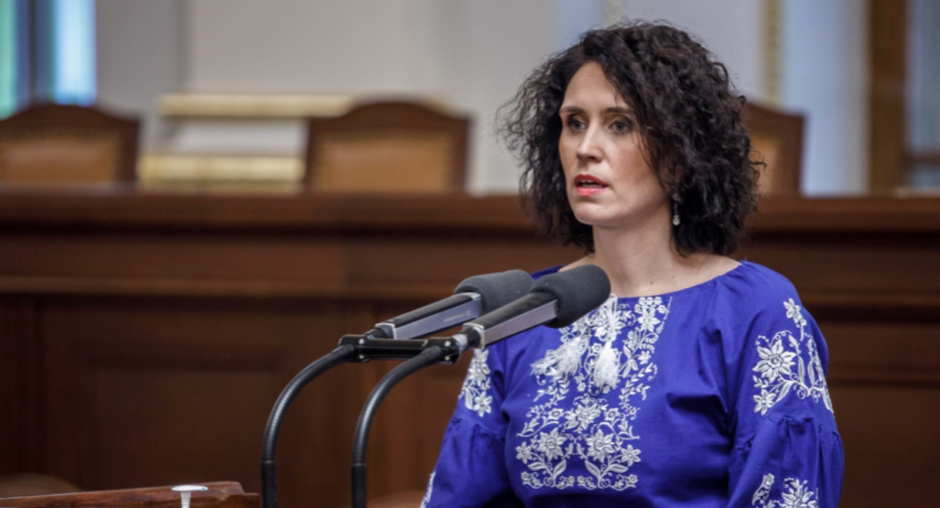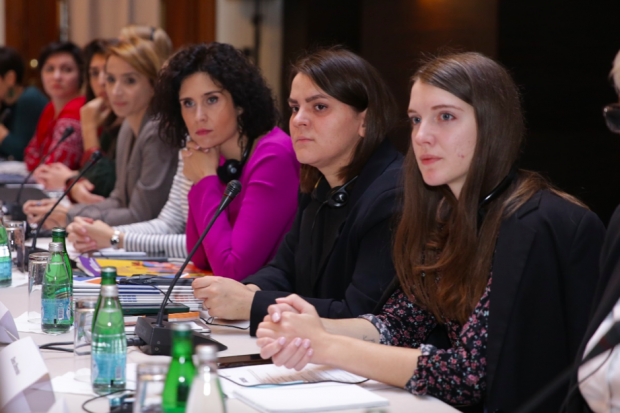Challenging stereotypes – how war gives young Ukrainian girls new opportunities
Yuliya Sporysh’s work days are diverse and extremely busy – one day she is giving speeches at international conferences and the next she is connecting with survivors of gender-based violence in Ukraine. As the founder and director of the Ukrainian NGO “Girls”, Yuliya’s work has increased tenfold and has already supported 150,000 women and girls, since the start of Russia’s full-scale invasion in Ukraine.
The idea is born
Back in 2016, while staying in the maternity hospital, Yuliya observed confused young women around her who were not ready to face the new reality of being a mother and caring for a baby. This was how she came up with the idea of creating the NGO “Girls”.
“I gave birth to my son in 2016. In intensive care, I realized that many young women and girls, the same as me, did not understand all the changes that were happening and were about to happen in their lives. Later, I talked with my doctor about how there was a lack of sexual education and information about women’s physiology in Ukraine,” Yuliya says. To prevent women from making mistakes that can negatively impact their lives in the long term, she teamed up with gynecologists to organize lectures on sexual education for teenage girls.
As these lectures became more popular, Yuliya started thinking about expanding the scope of her work in this area. On a 14-hour flight from Singapore to Berlin, she decided to fundraise systematically and create an NGO.
By 2020, she launched the NGO “Girls” and started working successfully on sexual education and preventing gender-based violence.
Adapting to meet new challenges
“We never planned to work in the humanitarian sector. But when the war started, the first thing we did was donating money to support people fleeing,” Yuliya says.
During the first days of the war, Yuliya herself had a chance to leave Irpin, a suburb of Kyiv, which became an epicentre of hostilities. As soon as she and her children reached Poland safely, Yuliya called the partners of her NGO to use 2022 projects’ funds to support the affected areas of Kyiv oblast. “There was no time to prepare. On the fourth day they already received first aid,” she says.
Today, the NGO “Girls” is engaged in complex projects supporting women and children in Ukraine – from organizing shelters to providing humanitarian aid. They have a large team of psychologists working on the rehabilitation of children who have suffered from the war.
“We organise many camps and sports activities for children and we also provide safe places for women. We offer training courses for women and legal aid for everyone. We don’t turn anyone down,” Yuliya says.
Last year only, “Girls” could support 150,000 people. They work all over Ukraine in more than 120 locations. “During the war, our team has increased tenfold, and 99% of us are women. So far, we have worked with more than 150,000 women and girls in Ukraine,” the activist says proudly.
Reducing the digital divide
Yuliya quickly managed to get major donors' help and start cooperation with international organizations such as OSCE. Now, "Girls" is a part of the OSCE Networking platform for sharing expertise between women's organizations and experts who are engaged in helping survivors of gender-based violence, including conflict-related sexual violence.
In early March 2023, with the support of the OSCE, Yuliya delivered a speech in New York, within the framework of the 67th UN Commission on the Status of Women. She spoke about women's digital empowerment in times of war, specifically focusing on the barriers preventing Ukrainian women from entering the digital era.
“We are a country with a well-developed digital infrastructure. But we offer practically no guidance to women and girls on how to build a career and become independent. After graduation, many would shelve their diplomas and become highly educated housewives,” Yuliya reflects.
Her team observed that many women do not have their own devices, which is often an obstacle to teaching them new digital skills. “The war made it even worse, as people fleeing their homes took only documents and essentials, often leaving computers and laptops behind. In some cases, electronic devices have been confiscated by Russian forces during the so called ‘filtration’,” Yuliya says. (A system of security checks and personal data collection - e.d.)
Collecting data to understand the barriers
A sociologist by training, Yuliya has recently fulfilled her long-held dream: conducting the “Women and Stigma” research that her organization has just finalised.
According to its findings, Ukrainian families still teach girls that their main role is to be good wives and raise children. In particular, 73% of mothers are convinced that a woman should go on maternity leave because "no one can do a better job of raising a child." Also, 64% of women surveyed believe that abortion leads to infertility, and 60% of women believe that children be born in marriage.Patriarchal stereotypes have only been intensified during the war. Many women were forced to put their careers on hold when leaving Ukraine and taking their children with them to safer places.
“Why do I call it a great sociological dream? Because no significant research has been conducted in Ukraine about teenage girls in particular. We want to understand the barriers that prevent Ukrainian girls from being healthy, successful and independent. The answer is quite simple: it is due to parents’ stereotypes, their unawareness of the importance of this part of life, the lack of information and the absence of examples of good female leaders,” she explains.
According to Yuliya, this was the first research in a series. “Girls” plans to conduct this research every five years to assess how the organisation's activities, alongside government programmes and international projects, promote changes in the behaviour of teenage girls and their parents.
Invisible women
“When you have ten meetings a day, you don’t have time to sit peacefully and write about how good you are,” Yuliya answers when asked why the work of women’s organisations in Ukraine is often left unnoticed.
“Maybe people have yet to realise how much has been accomplished by women. If you think about it and look around, you will see women carrying, gathering, packing, knitting, and so on,” she points out.
Russia’s invasion did not stop Yuliya and her team. Instead, it encouraged them to act with more determination and to expand their dreams. “Our motto is ‘You Are Not Alone’, and if a woman faces a problem she can’t handle, I urge her to come to us. Ultimately, our mission is to make Ukrainian women self-sufficient, economically independent, and help them enjoy their lives,” Yuliya says.
This story is part of a series, prepared by the OSCE’s WIN for Women and Men. This is a project aimed at strengthening comprehensive security through innovating and networking for gender equality to showcase women leadership responding to the humanitarian crisis caused by the war in Ukraine. Women leaders are the inspiration and the reason behind the WIN Project, which strengthens OSCE-supported networks and gives rise to new networks, fostering women’s participation and leadership, as well as broader men’s engagement in achieving gender equality.



